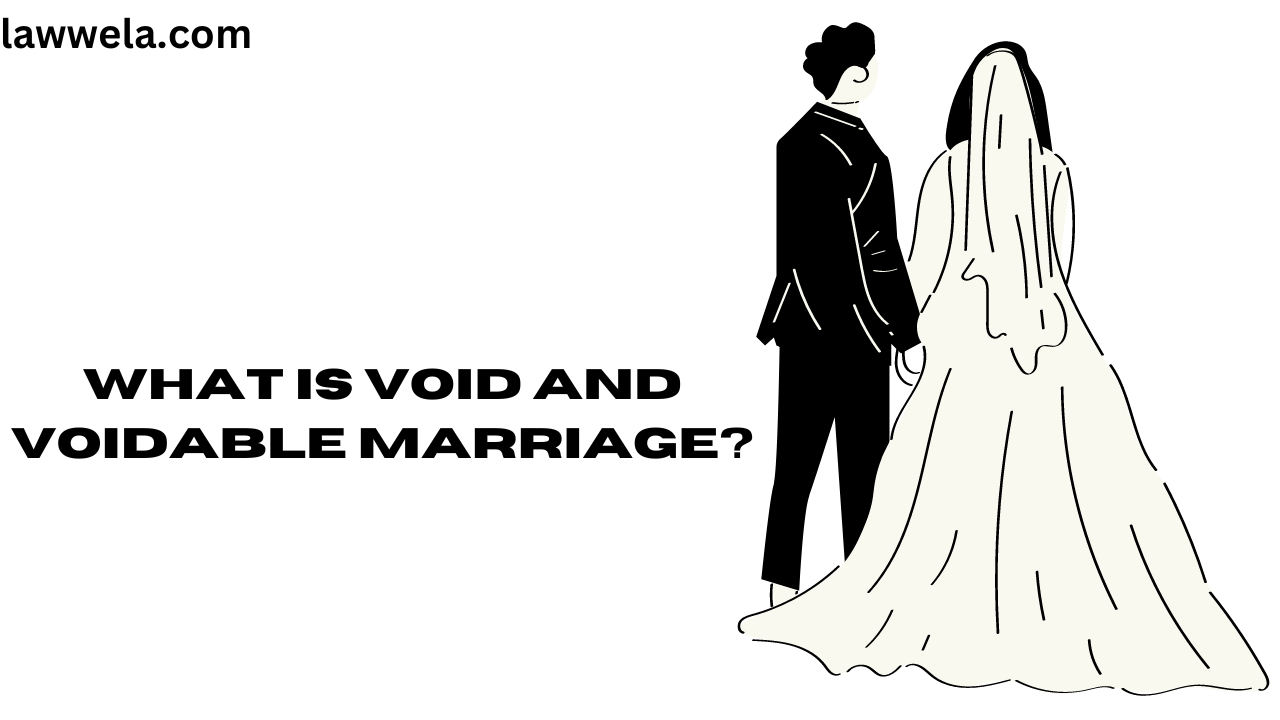What is Void and voidable marriage?
The marriage concept is to form a relationship between husband and wife. Marriage is religiously very pure. According to Section 5, the Hindu Marriage Act of 1955 accepted Hindu marriage as a religious ceremony. It binds husband and wife to perform religious duties. Divorce or nullity was not recognized under Hindu law until the Hindu Marriage Act was enacted. Marriage is also considered a contract between two parties to live with each other. But sometimes it turns into a void and voidable marriage.
Types of marriage
- Valid marriage
- Void marriage
- Voidable marriage
What is a valid marriage?
A marriage is valid if it fulfills some conditions which are given under section 5 of the Hindu Marriage Act.
- If both parties have no spouse living at the time of the marriage.
- Both parties should be above the age of majority
- Parties should not be in blood relation to each other (spindas)
For a valid marriage, both parties should not be
- When a person is incapable of giving valid consent due to the unsoundness of mind
- Capable to an extent as to be fit for giving birth or suffering from a mental disorder
Nullity of marriage
It is a judicial declaration that marriage was not in existence. It states that there is no valid marriage performed between the two parties. The nullity of marriage is related to the pre-marriage impediments. If there is some impediments exist then the parties can not marry each other. If they are so their marriage may not be valid.
Impediments are divided into two categories
- Absolute impediments
It means marriage is invalid from the very start and the marriage is void
- Relative impediments
If it exists the marriage is voidable for eg it may be avoided by one of the parties in the marriage in case he or she desires.
What is void marriage?
The marriage which is invalid from the start is called void marriage. These types of marriages are also taken as illegal. But still, it is called marriage because the two people do all the rituals and customs which is done in the marriage. It comes under section 11 of the Hindu Marriage Act 1955.
There are some reasons why marriage is invalid or void
- When the male person is under the age of 21 years
- When the female is under the age of 18 years
- When both spouses are in a (Spinda) relationship in (blood relation)
- When the spouses are within the prohibited degrees of relationship
- When the party was already married to another person the spouse of the old marriage is still living at the time of the marriage and the former marriage is still in force (bigamy).
What is voidable marriage?
When Marriage fails on some grounds of divorce then husband and wife file a petition for divorce in the court but there are also some other circumstances in which marriage can be dissolved without divorce. There are provisions given under section 12 of the Hindu Marriage Act where the court may declare the marriage is void.
Conditions for voidable marriage
- Venereal disease- if the person suffering from such disease which communicable then the marriage is voidable
- Impotency- if any of the spouses is incapable or unable to do marital cohabitation then marriage is voidable
- Consent- if the marriage is done without the consent of the parties or consent is taken by coercion the marriage will be voidable.
- Consent of guardian- when the marriage is done without the consent of parents or guardians it is considered as voidable marriage.
- Pregnancy- if the party is already pregnant at the time of marriage from another person it will be considered voidable marriage
- Unsound mind- if the party is not capable of giving consent due to the unsoundness of mind
- Mental disorder- when the party is suffering from a mental disorder that makes her unfit to give birth then the marriage becomes voidable
- Insanity – Suffering from repeated attacks it will be a voidable marriage
- Under the age of majority- when the bride is under the age of 18 and the groom is under the age of 21 then the marriage is voidable
Difference between void and voidable marriage
Void marriage
1- When marriage is void ab into which means marriage is invalid from the start.
2- The wife has no right to maintenance
3- Both are not considered as husband and wife
4- A decree of nullity is not required
5- Children in void marriage are considered as a legitimate child
Voidable marriage
1- Marriage is open to one party or both parties
2- The wife has all rights to maintenance
3- They are considered as husband and wife
4- A decree of nullity is required
5- In voidable marriage children are considered legitimate child
Legitimacy of children under void and voidable marriages
Legitimate children are mentioned under section 16 of the Hindu Marriage Act, 1955. In a void marriage, the child is considered a legitimate child. And in voidable marriage child is also considered as legitimate. Even if under sections 11 and 12 the marriage is null and void in such circumstances child is born it is considered legitimate. But if the bride is already pregnant at the time of marriage from another person then the child is considered an illegitimate child.
Rights of a Legitimate Child
- A child born out of a void or voidable marriage should be treated equally as a legitimate child
- Such a child has all rights equally in property of his or her parents only.
Conclusion
The parties had only one remedy to get out of the Hindu Marriage which is given under sections 11 and 12 of the Hindu Marriage Act. There are certain grounds for valid marriage if it violates then the marriage is considered void and voidable.


1 thought on “What is Void and voidable marriage?”